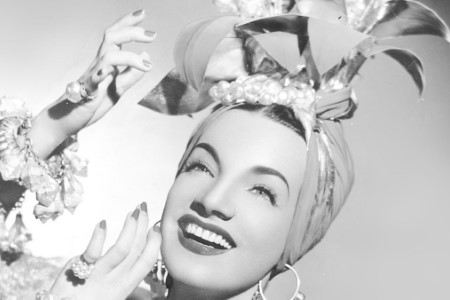Carmen Miranda
Maria do Carmo Miranda da Cunha, GCIH, OMC, known professionally as Carmen Miranda, was born on February 9, 1909, and left an indelible mark as a Portuguese-born Brazilian singer, dancer, and actress until her untimely passing on August 5, 1955. Affectionately dubbed “The Brazilian Bombshell,” she became famous for her iconic fruit hat outfits showcased in her American films.
Miranda began her artistic journey by designing hats in a boutique before making her inaugural recordings with composer Josué de Barros in 1929. Her breakthrough came in 1930 with the recording of “Taí (Pra Você Gostar de Mim),” propelling her to stardom in Brazil as a leading interpreter of samba.
Throughout the 1930s, Miranda graced Brazilian radio and appeared in chanchadas, Brazilian films celebrating music, dance, and carnival culture. Notable titles like “Hello, Hello Brazil!” and “Hello, Hello, Carnival!” captured the essence of Miranda’s early cinematic work. In the 1939 musical “Banana da Terra,” she introduced her distinctive “Baiana” image, inspired by Afro-Brazilians from Bahia.
Broadway producer Lee Shubert recognized Miranda’s talent and offered her a contract in 1939 to perform in “The Streets of Paris.” This marked the beginning of her Hollywood career, and her first film, “Down Argentine Way” (1940), solidified her exotic persona. By 1943, her starring role in Busby Berkeley’s “The Gang’s All Here” further emphasized her trademark fruit hats, and she became the highest-paid woman in the United States by 1945.
Miranda made a total of fourteen Hollywood films between 1940 and 1953. Despite her initial success, her popularity waned after World War II. She grew resentful of the stereotypical image she had acquired as the “Brazilian Bombshell” but continued to make valuable contributions to popularizing Brazilian music and Latin culture. She diversified her career with nightclub appearances and television variety shows.
In 1941, Carmen Miranda achieved historical milestones, becoming the first Latin American star to leave her hand and footprints at Grauman’s Chinese Theatre and the first South American honored with a star on the Hollywood Walk of Fame. Despite facing stereotypes, Miranda’s legacy endured, influencing Brazil’s 1960s Tropicalismo cultural movement. A museum in Rio de Janeiro commemorates her, and the documentary “Carmen Miranda: Bananas is My Business” (1995) delves into her fascinating life and career.
The use of images or names herein does not necessarily imply any form of management or representation or that The Celebrity Group was wholly responsible for a specific endorsement. The Celebrity Group works in partnership with many agents & managers for the supply of celebrities not represented by ourselves.



